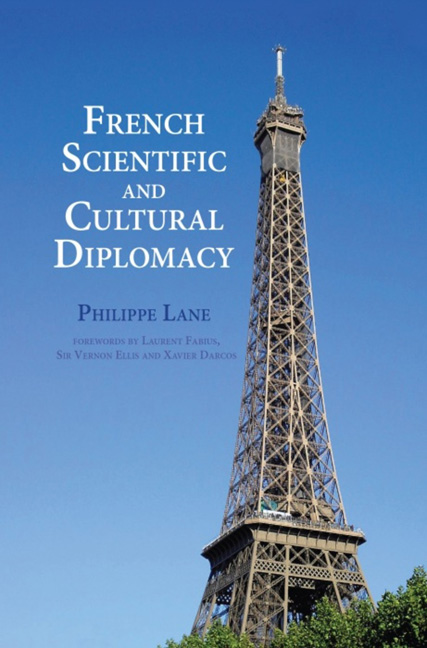Book contents
- Frontmatter
- Contents
- List of Tables
- List of Abbreviations
- Acknowledgements
- Foreword
- Foreword
- Foreword
- Introduction
- 1 French Foreign Cultural Activities: A Tradition with a Long History
- 2 Cultural and Scientific Action since 1995: Soft Power or Hard Power?
- 3 The Protagonists of Cultural and Scientific Diplomacy; 2011: A New Start
- 4 Cultural Diplomacy and the Arts
- 5 Science and University Diplomacy
- 6 Linguistic and Educational Cooperation
- 7 The Organization and Implementation of French Cultural and Scientific Activities Abroad
- Conclusion
- Index
1 - French Foreign Cultural Activities: A Tradition with a Long History
- Frontmatter
- Contents
- List of Tables
- List of Abbreviations
- Acknowledgements
- Foreword
- Foreword
- Foreword
- Introduction
- 1 French Foreign Cultural Activities: A Tradition with a Long History
- 2 Cultural and Scientific Action since 1995: Soft Power or Hard Power?
- 3 The Protagonists of Cultural and Scientific Diplomacy; 2011: A New Start
- 4 Cultural Diplomacy and the Arts
- 5 Science and University Diplomacy
- 6 Linguistic and Educational Cooperation
- 7 The Organization and Implementation of French Cultural and Scientific Activities Abroad
- Conclusion
- Index
Summary
French cultural diplomacy can trace its roots to the Ancien Régime, since which time the links between literature and diplomacy have been extremely strong. From the sixteenth century to the eighteenth century, as Jean-François de Raymond points out in his book L'action culturelle extérieure de la France (2000), many diplomats were also men of letters.
Arts, Literature and Diplomacy under the Ancien Regime
Joachim du Bellay, famed for his collection of poems entitled Regrets and his Défense et illustration de la langue française, travelled to Rome in 1553 as secretary and steward to his powerful cousin Cardinal Jean du Bellay, who was attached to the Vatican. Thus the dual presence of the name of du Bellay, in the realm of ‘letters’ and in that of ‘affairs’ and as society dignitaries, implies that the literary glory attached to the name of an author cannot be distinguished readily from the social, where accident of birth and accomplishments at war or in politics are elements.
During this same sixteenth century, when the challenge was to protect Christians within the Ottoman Empire, François I obtained recognition from Suleiman the Magnificent that French culture and language must be preserved. French diplomacy thus defended the status of Christians to whom this sultan had granted protection in the East in a treaty signed in 1535 with François I – the treaty on which was based the development of French cultural and linguistic influence in this part of the world. In the reign of Louis XIII, in the seventeenth century, similar examples occurred in Canada, in Madagascar, Tunis and Algiers, and through the activities of the Société des missions étrangères (Foreign Missionary Society) in the Far East.
This strong relationship between political and cultural activities is thus an essential part of French diplomacy: as early as the seventeenth century, Richelieu, and after him Mazarin, would appoint literary academics as ambassadors in charge of the promotion of the French language, which was the language of European courts and of the arts, and they performed an integral part in locating and securing works of art for the royal collections. In this way, the sciences, arts and literature were prerequisites to diplomatic relations and facilitated preliminary exchanges in any subsequent negotiations.
Many works linked to the functions of ambassador published in the seventeenth and eighteenth centuries highlight the cultural expertise essential to the profession of diplomat.
- Type
- Chapter
- Information
- French Scientific and Cultural Diplomacy , pp. 7 - 18Publisher: Liverpool University PressPrint publication year: 2013



